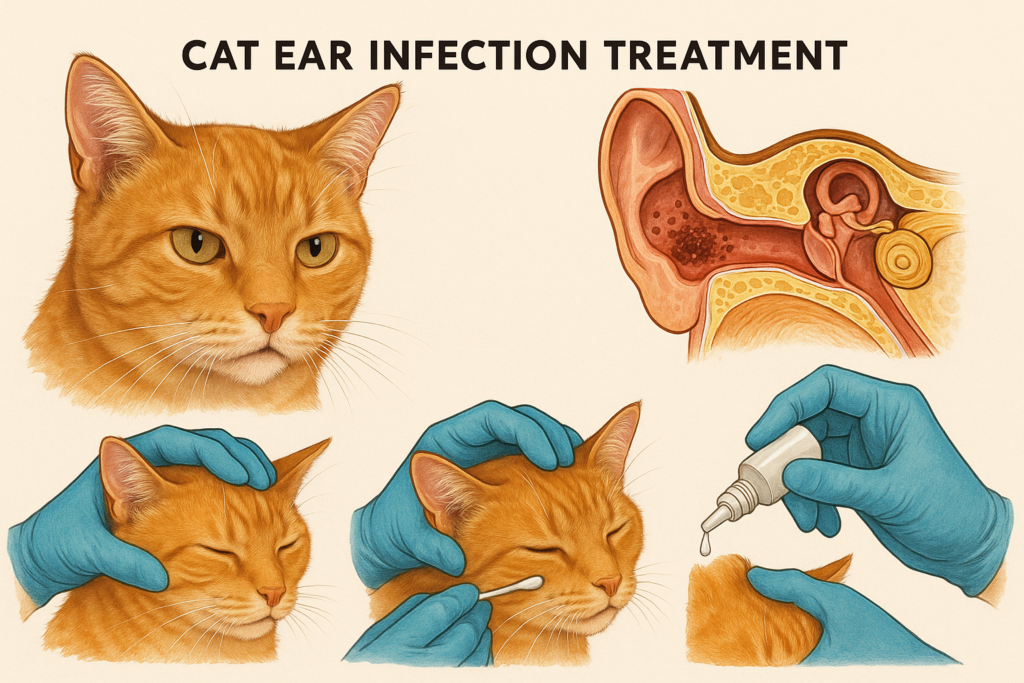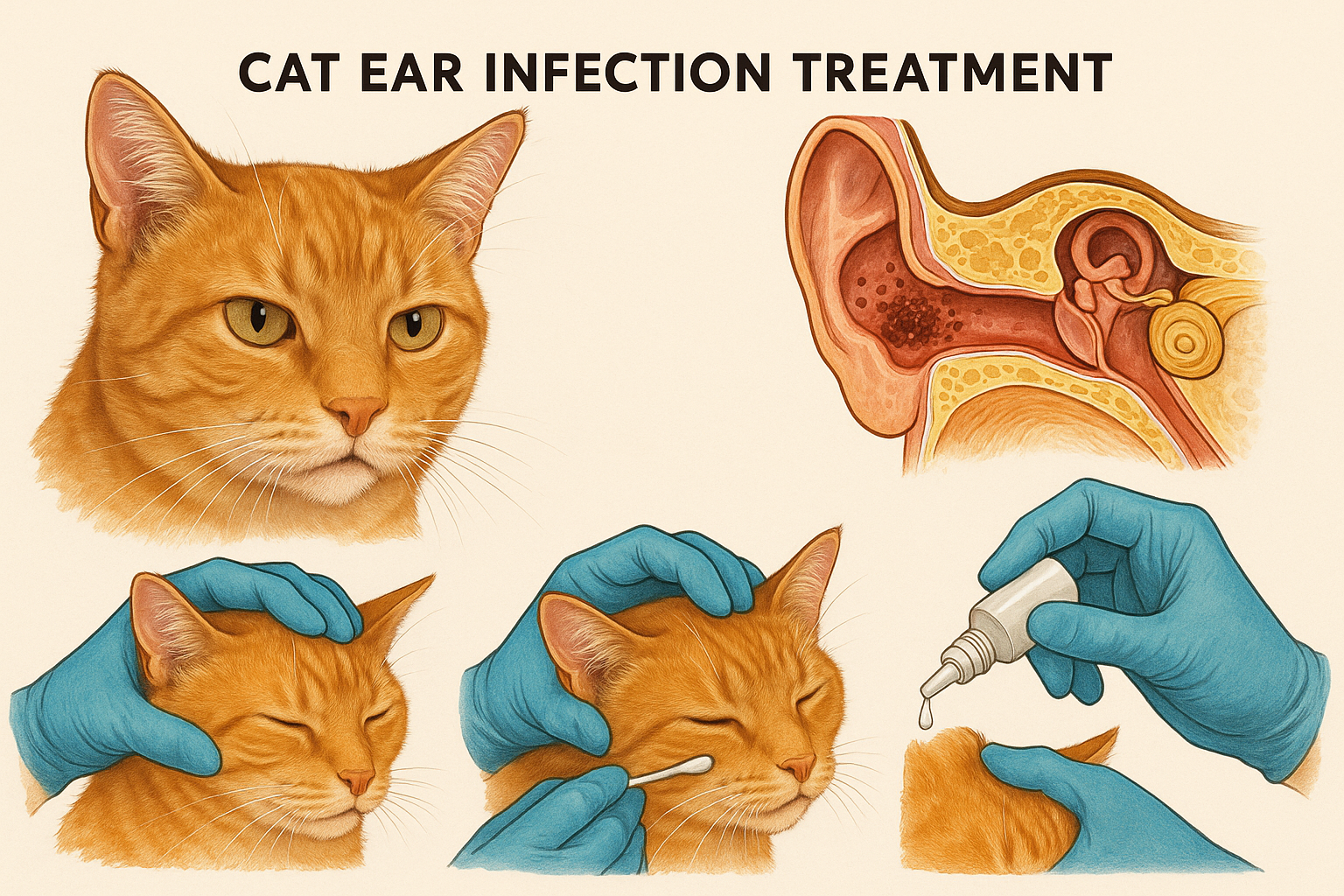Cat Ear Infection Treatment: What Every Pet Owner Should Know
Ear infections in cats are more common than many pet owners realize, and they can cause significant discomfort if left untreated. From excessive scratching to head shaking, the signs of an ear infection can be hard to ignore. While some cases may resolve with simple at-home care, others require professional veterinary attention to address underlying issues. Understanding the causes, symptoms, and treatment options for cat ear infections is essential for ensuring your feline friend stays happy and healthy. Let’s explore everything you need to know about diagnosing, treating, and preventing this common yet manageable condition.
Common Causes of Cat Ear Infections
Ear infections in cats can stem from a variety of factors, ranging from environmental irritants to underlying health conditions. Identifying the root cause is crucial for effective treatment.
Ear Mites:
These tiny parasites are one of the most common culprits, especially in kittens or outdoor cats. They create irritation and lead to excessive scratching.Bacterial or Fungal Infections:
Bacteria or yeast overgrowth in the ear canal can result in inflammation, discharge, and odor.Allergies:
Food or environmental allergies often manifest as ear infections due to increased sensitivity and inflammation.Foreign Objects:
Grass seeds, dirt, or other debris trapped in the ear can cause irritation and infection if not removed promptly.Underlying Health Issues:
Conditions like diabetes or autoimmune disorders can weaken a cat’s immune system, making them more prone to ear infections.
Understanding these causes helps you take proactive steps to prevent infections and seek appropriate treatment when needed.

Signs Your Cat May Have an Ear Infection
Recognizing the symptoms of an ear infection early can make a big difference in your cat’s recovery. Look out for these telltale signs that indicate something may be wrong.
Excessive Scratching or Pawing at the Ears:
Cats with ear infections often scratch their ears frequently to relieve itching, which can lead to further irritation or injury.Head Shaking or Tilting:
Persistent head shaking or tilting is a common sign of discomfort caused by ear infections.Unpleasant Odor from the Ears:
A strong, foul smell emanating from your cat’s ears is a red flag for bacterial or fungal infections.Discharge or Debris in the Ear Canal:
Yellow, brown, or bloody discharge may indicate an active infection requiring immediate attention.Redness or Swelling of the Ear Flaps:
Inflamed or swollen ear flaps signal inflammation or irritation within the ear.
By staying vigilant and recognizing these symptoms early, you can ensure your cat receives prompt treatment and avoids complications.
Check this guide 👉Cat Ear Infection Symptoms: Best 7 Health Tips!
Check this guide 👉Understanding Cat Ear Cancer: Best 7 Expert Tips!
Check this guide 👉Black Dots in Cat Ear: Best 7 Expert Tips!
Types of Cat Ear Infections | Treatment Options |
|---|---|
Ear mite infestations | Anti-parasitic medications |
Bacterial infections | Antibiotic ear drops or oral antibiotics |
Yeast (fungal) infections | Antifungal medications |
Allergy-related ear infections | Allergy management and corticosteroids |
Foreign object-induced infections | Removal of debris and cleaning |
Steps to Treat a Cat Ear Infection at Home
While some ear infections require veterinary care, mild cases can often be managed at home with proper guidance. Follow these steps to provide relief and support your cat’s recovery.
Clean the Ears Gently:
Use a vet-recommended ear cleaner to remove debris and excess wax without causing further irritation.Apply Prescribed Medications:
If your vet has provided medication, administer it exactly as directed to ensure effectiveness.Monitor for Improvement:
Keep an eye on your cat’s symptoms to ensure they’re improving. Contact your vet if there’s no progress after a few days.Prevent Scratching:
Consider using an Elizabethan collar to stop your cat from scratching or worsening the infection.Maintain Regular Ear Hygiene:
Establish a routine of gentle ear cleaning to prevent future infections, especially if your cat is prone to them.
With careful attention and consistent care, many ear infections can be resolved effectively at home.
When to Seek Veterinary Care for Your Cat’s Ear Infection
While some ear infections can be treated at home, others require professional intervention. Knowing when to consult your vet ensures your cat gets the care they need.
Persistent Symptoms Despite Treatment:
If your cat’s symptoms don’t improve after a week of treatment, it’s time to revisit the vet.Severe Pain or Discomfort:
Signs of extreme pain, such as vocalization or aggression when touched, warrant immediate attention.Swelling or Abscess Formation:
Swollen areas or abscesses near the ear indicate a serious issue that needs professional care.Foul-Smelling Discharge or Bleeding:
Unusual discharge or blood suggests a more severe infection or injury requiring diagnosis and treatment.Behavioral Changes:
Lethargy, loss of appetite, or unusual behavior may signal a systemic issue linked to the ear infection.
Prompt veterinary care can prevent complications and ensure your cat recovers fully.
Preventive Measures for Cat Ear Health
Prevention is always better than cure when it comes to cat ear infections. Implementing these strategies can help keep your cat’s ears healthy and infection-free.
Regular Ear Cleaning:
Clean your cat’s ears monthly or as recommended by your vet to remove dirt and prevent buildup.Parasite Control:
Use flea and tick prevention products to reduce the risk of ear mites and other pests.Diet and Nutrition:
A balanced diet supports your cat’s immune system, making them less susceptible to infections.Environmental Hygiene:
Keep your cat’s living space clean and free of allergens that could irritate their ears.Routine Vet Check-Ups:
Schedule regular veterinary visits to catch potential issues early and maintain overall health.
By taking these preventive steps, you can minimize the likelihood of ear infections and keep your cat comfortable year-round.
Common Mistakes to Avoid When Treating Ear Infections
Treating a cat’s ear infection requires care and precision. Avoiding these common mistakes ensures a smoother recovery process.
Using Cotton Swabs:
Inserting cotton swabs into the ear canal can push debris further inside and cause injury.Skipping Vet Visits:
Self-diagnosing and treating without professional guidance may lead to mismanagement of the condition.Over-Cleaning the Ears:
Excessive cleaning can irritate the ear and disrupt its natural balance, worsening the problem.Ignoring Underlying Causes:
Failing to address root issues like allergies or parasites can result in recurring infections.Stopping Treatment Early:
Ceasing medication prematurely allows the infection to return or become resistant to treatment.
Avoiding these pitfalls ensures your cat receives safe and effective care during their recovery.
Natural Remedies for Mild Ear Infections
For minor ear issues, some pet owners turn to natural remedies as complementary treatments. However, always consult your vet before trying these solutions.
Apple Cider Vinegar Solution:
Mix equal parts water and apple cider vinegar to gently clean the outer ear, but avoid using it if the ear is raw or irritated.Coconut Oil:
Apply a small amount of organic coconut oil to soothe dryness and combat yeast growth, though sparingly.Green Tea Rinse:
Brew cooled green tea and use it as a mild rinse to reduce inflammation and fight bacteria.Aloe Vera Gel:
Pure aloe vera gel can provide relief for irritated skin around the ear, but ensure it’s free of additives.Probiotics:
Adding probiotics to your cat’s diet may boost their immune system and help prevent recurrent infections.
While natural remedies can offer support, they should never replace professional veterinary care for serious infections.
Frequently Asked Questions About Cat Ear Infections
Can I use over-the-counter ear drops for my cat?
No, always consult your vet before using any medication, as improper treatment can worsen the infection.
How long does it take for a cat ear infection to heal?
Mild infections may resolve within 7-10 days with proper treatment, but severe cases may take longer.
Are ear infections contagious between cats?
Ear mite infestations can spread between cats, but bacterial or fungal infections are not typically contagious.
Can ear infections cause hearing loss in cats?
Untreated or chronic infections may lead to temporary or permanent hearing damage, so early treatment is critical.
How can I prevent ear infections in my cat?
Regular ear cleaning, parasite prevention, and addressing allergies can significantly reduce the risk of infections.
Prioritizing Your Cat’s Ear Health
Ear infections in cats are uncomfortable and potentially harmful if ignored, but with timely treatment and preventive measures, they can be managed successfully. By understanding the causes, recognizing the symptoms, and following proper care protocols, you can ensure your feline companion enjoys optimal ear health. Whether you’re treating a minor infection at home or seeking veterinary assistance for a more complex case, your proactive approach will make all the difference. Remember, a healthy cat is a happy cat—and that starts with attentive care for every part of their body, including their ears.
Cat Anaphylactic Shock Treatment Costs: Best 7 Expert Tips! – Learn about costs, treatments, and financial aid options to save your cat’s life.
Exocrine Pancreatic Insufficiency in Cats: Best 7 Tips! – Learn to spot symptoms, manage EPI effectively, and improve your cat’s quality of life with expert advice.
Cost of Dog Anaphylactic Shock Treatment: Best 7 Tips! – Learn about emergency costs, financial planning, and ways to manage expenses for your dog’s care.
Exocrine Pancreatic Insufficiency in Dogs: Best 7 Tips! – Learn to spot symptoms, manage EPI effectively, and improve your dog’s quality of life with expert guidance.





